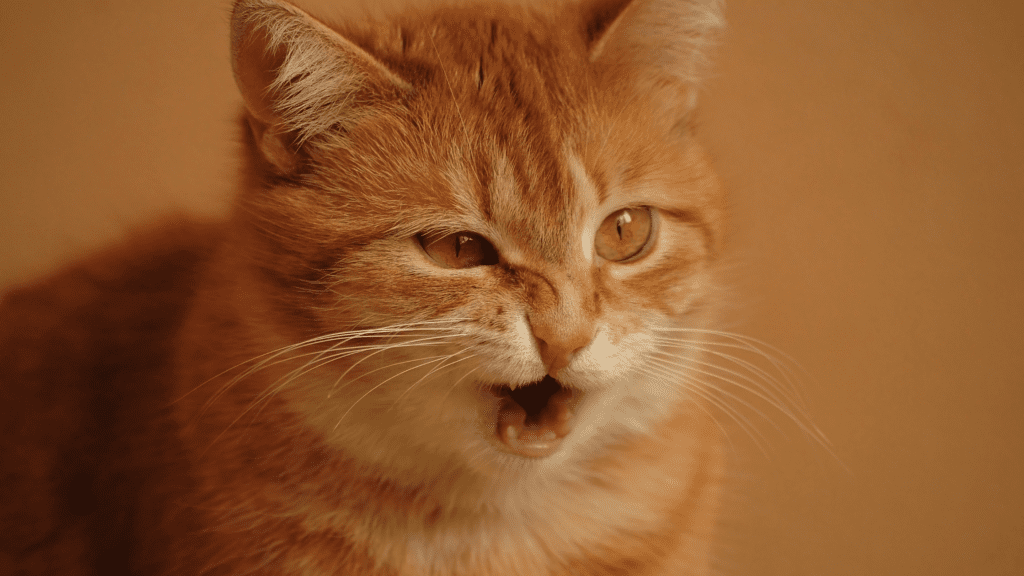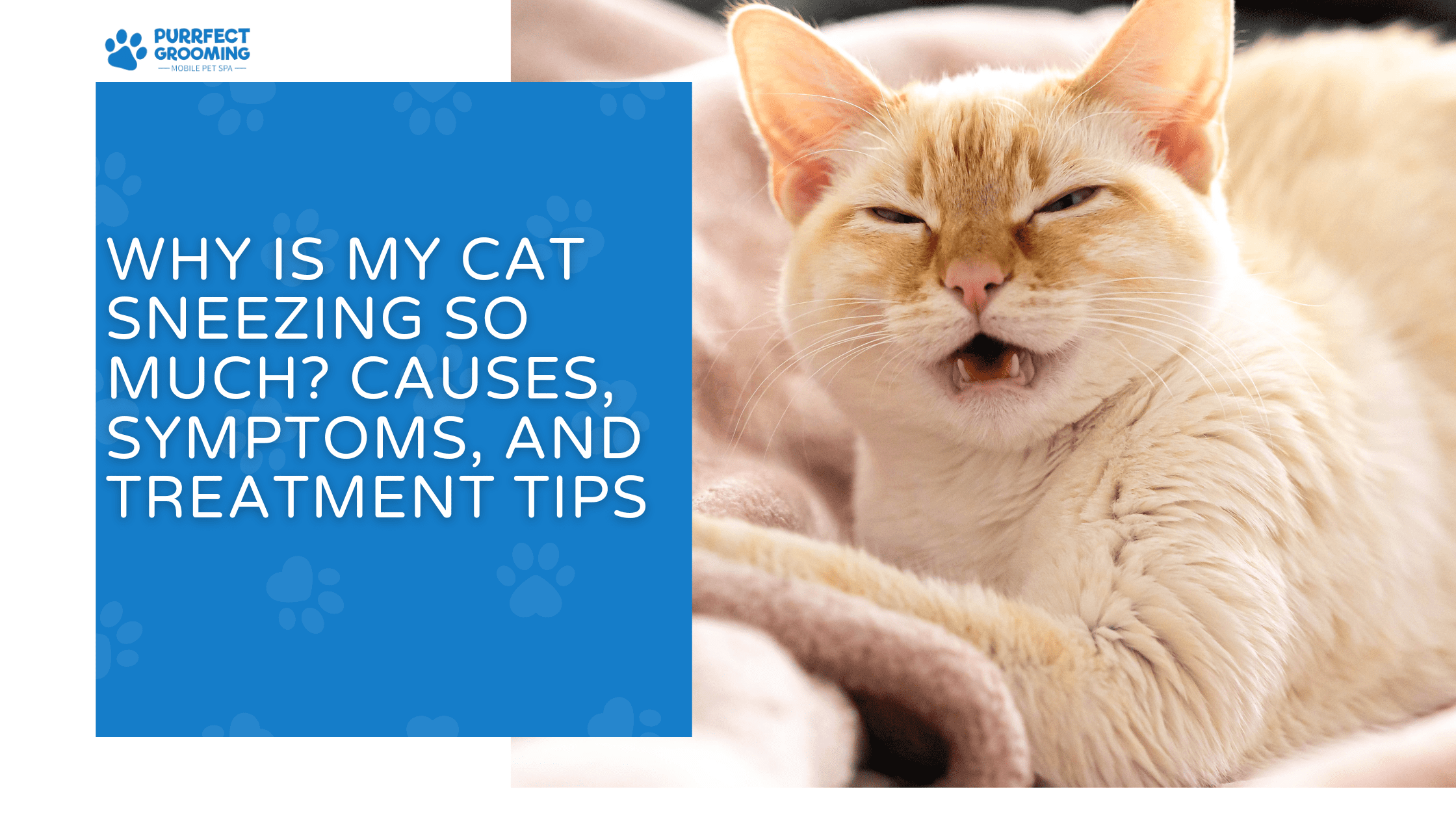Why is My Cat Sneezing So Much? Causes, Symptoms, and Treatment Tips
Cats are wonderful companions, but when they start sneezing frequently, it can be a cause for concern. Why is my cat sneezing so much? You might be wondering if it’s something as simple as dust or if there’s a more serious health issue at play. In this article, we will explore the common reasons behind your cat’s sneezing, possible treatments, and when it’s time to seek professional help.
If your cat is sneezing frequently, it could be due to something as simple as dust or pollen, or it might signal an underlying health issue like an upper respiratory infection, allergies, or even dental problems. According to VCA Animal Hospitals, occasional sneezing is normal, but persistent or severe sneezing can indicate conditions that need veterinary attention, such as viral infections or nasal irritants

Common Reasons Why Cats Sneeze
Sneezing is a natural reflex that helps clear the nasal passages of irritants. However, if your cat is sneezing more than usual, it could be due to a variety of reasons. Here are some of the most common causes of sneezing in cats:
Allergies
Just like humans, cats can have allergic reactions to a variety of substances. Whether it’s pollen, dust mites, mold, or certain foods, allergies can cause sneezing, watery eyes, and nasal discharge. If your cat’s sneezing is seasonal, it may be due to pollen allergies. However, some cats have year-round allergies.
Symptoms of Cat Allergies:
| Symptom | Description |
| Sneezing | Frequent or sudden sneezing episodes |
| Watery eyes | Excessive tearing, runny eyes |
| Itchy skin | Scratching or licking excessively |
| Breathing issues | Labored breathing or wheezing |
Upper Respiratory Infections
Upper respiratory infections (URIs) are a common cause of sneezing in cats. These infections can be viral or bacterial and often accompany other symptoms such as coughing, nasal discharge, and loss of appetite. The most common viral infection in cats is feline herpesvirus (FHV-1), which causes symptoms similar to the common cold in humans.
Viral vs. Bacterial Infections:
| Type of Infection | Symptoms | Treatment |
| Viral | Sneezing, coughing, nasal discharge | Often resolves with time; antiviral meds may help |
| Bacterial | Yellow/green discharge, fever, lethargy | Antibiotics prescribed by a vet |
Foreign Objects in the Nose
Sometimes, a foreign object, like a blade of grass or a small piece of dirt, can get stuck in your cat’s nose. This will cause irritation and lead to frequent sneezing as your cat’s body tries to expel the object.
Treatment for Foreign Object Blockages:
- A vet can safely remove the object using special tools.
- If left untreated, it can lead to infections.
Dry Air and Environmental Irritants
Dry air, especially during winter months, can dry out your cat’s nasal passages, leading to irritation and sneezing. Additionally, environmental irritants such as cigarette smoke, cleaning products, or strong perfumes can also trigger sneezing in sensitive cats.
Why Does My Cat Keep Sneezing? A Deeper Dive
If your cat is sneezing frequently or experiencing other symptoms like nasal discharge, coughing, or lethargy, it’s time to explore the underlying health conditions that could be causing the problem.
Dental Issues
Did you know that dental issues can lead to sneezing in cats? Infections or abscesses in the teeth or gums can spread to the sinuses, causing sneezing as a secondary symptom.
Symptoms to Watch for:
| Symptom | Description |
| Bad breath | Foul-smelling breath due to infection |
| Drooling | Excessive drooling due to oral pain |
| Swollen face | Swelling around the face or mouth area |
What Causes Cats to Sneeze More Than Usual?
Some cats may sneeze more frequently due to chronic respiratory conditions, which can worsen over time without proper care. Here’s a deeper look into chronic conditions that could be the cause:
Chronic Respiratory Conditions
Feline Asthma is a condition that causes inflammation in the airways, leading to difficulty breathing and frequent sneezing. This condition requires lifelong management, but with the right treatment, cats can live comfortably.
Chronic Sinusitis is another condition that can cause persistent sneezing. This is often a result of repeated upper respiratory infections or other chronic conditions.
How to Treat Sneezing in Cats
If your cat is sneezing a lot, it’s essential to determine the underlying cause before choosing the right treatment. Depending on the cause, your vet might suggest a combination of medications, lifestyle changes, or home remedies.
Home Remedies for Cat Sneezing
Some home remedies can help alleviate sneezing, especially if it’s due to dry air or allergies:
- Humidifiers: Adding moisture to the air can help soothe irritated nasal passages.
- Nasal Saline Drops: These can help clear nasal congestion.
- Steam: Running a hot shower and letting your cat sit in the steam can help with sinus congestion.
How to Prevent Sneezing in Cats
Prevention is always better than cure. Here are some tips to reduce your cat’s chances of sneezing in the future:
Keeping Your Home Clean
Dust and allergens are common triggers for sneezing. Regularly cleaning your home and keeping it free of dust and mold can make a big difference for your cat’s health.
Regular Vet Check-Ups
Make sure to take your cat to the vet for regular check-ups, especially if they have a history of respiratory issues. Regular visits can help catch any health issues early and prevent complications.
You May Also Like : Why Do Cats Like Boxes?
Pro Tip:
If your cat’s sneezing is persistent and accompanied by symptoms like a loss of appetite or changes in behavior, don’t wait for it to resolve on its own. Book an appointment with your vet early to prevent any potential complications.
Conclusion
Sneezing in cats can be caused by a variety of factors, including allergies, infections, and environmental irritants. If your cat is sneezing more than usual, it’s essential to observe the accompanying symptoms and seek professional help if needed. With the right treatment and preventative care, most cats can overcome their sneezing and live comfortable, healthy lives.
FAQs
1. What should I do if my cat sneezes a lot?
If your cat is sneezing excessively, it’s best to observe their behavior. If they show additional signs like nasal discharge, coughing, or lethargy, contact a vet for further evaluation.
2. Can sneezing be a sign of a serious illness in cats?
Yes, frequent sneezing accompanied by other symptoms like fever, loss of appetite, or coughing could indicate a respiratory infection or chronic condition that requires professional attention.
3. How can I tell if my cat’s sneezing is due to allergies?
If your cat sneezes seasonally or after exposure to specific environmental triggers (like dust or pollen), it could be due to allergies.
4. Should I be concerned if my cat’s sneezing persists?
If your cat’s sneezing persists for more than a few days or worsens with other symptoms, it’s best to visit the vet to rule out serious conditions like infections or dental problems.
5. What are some home remedies for sneezing cats?
Using a humidifier, saline nasal drops, and steam therapy can help alleviate sneezing in cats, especially when caused by dry air or mild congestion.
